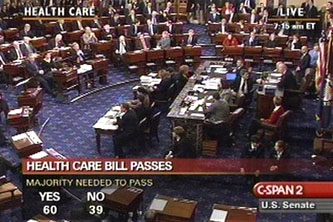The primary legal argument against Obamacare’s individual mandate turns on the distinction between activity and inactivity. Conservatives say that although the Commerce Clause gives Congress considerable power to prevent activity, it’s never been interpreted to give Congress the power to penalize inactivity. But the Affordable Care Act forces private citizens to purchase a commercial product, and that’s a bridge too far.
This has been debated endlessly, and since I’m not a lawyer or a constitutional scholar it hardly matters what I think about it. But from a layman’s point of view, I’ve always had two big problems with this theory:
- It’s brand new. Prior to the passage of ACA, no one had ever seriously brought this up as a legal distinction. It was invented solely as a way of justifying a court decision to overturn ACA.
- It’s not even true except in the most hyperlegalistic sense.
The second point requires some explanation. So here it is: the truth is that the federal government forces you to buy commercial products or engage in commercial activity all the time. If you buy a car, you must buy airbags along with it because federal regulations require it. If you want to travel overseas, you must  submit a pair of photos along with your passport application, and the only way to acquire these photos is by engaging in private commerce. Or take this, from Cato’s Ilya Shapiro:
submit a pair of photos along with your passport application, and the only way to acquire these photos is by engaging in private commerce. Or take this, from Cato’s Ilya Shapiro:
There is a qualitative difference between regulating or prohibiting existing economic activity and mandating that someone engage in such activity. When Randy Barnett [] first articulated that distinction and labeled the new assertion of federal power “unprecedented,” that’s what he meant: Congress has never forced people to engage in economic activity. Not during the New Deal — nobody had to become a farmer or buy wheat — nor during the Civil Rights Era — if you didn’t want to serve blacks, you could shut down your restaurant or hotel.
This is what I mean by hyperlegalistic. Did the Civil Rights Act force you to serve blacks in your diner? In every practical sense, yes, of course it did. The vast majority of motel and restaurant owners don’t have the option of simply shutting down their businesses. Likewise, you don’t have to buy a car and you don’t have to travel overseas, but in practical terms in modern America, there are millions of people who don’t really have that choice.
There are thousands of examples like this, where the federal government forces you to engage in a commercial transaction of some kind. In fact, it’s so common that most people barely even realize it. But you would, literally, have to be a hermit to avoid them all. In the real world, these requirements are essentially mandates to engage in a particular type of commercial activity, enforced by the police power of the state.
What’s more, the police power of the state is actually applied fairly sparingly in the case of ACA. If you’re poor, you qualify for Medicaid. If you’re a little less poor, the government provides generous subsidies to buy insurance. And if you decide not to buy insurance anyway, the penalty is pretty modest: $695 per adult or a maximum of 2.5% of income. That’s way less than the penalty for refusing to serve blacks in your roadside diner.
This is why it would be such an outrage for the Supreme Court to overturn the mandate. It’s simply not unprecedented, at least not in any practical sense. The federal government effectively forces us to buy lots of stuff, and it’s done so for decades. If you dig deep enough, you can find a shard of difference between all these cases and the ACA mandate, but that’s all it is: a shard. It’s a million miles from the kind of deep constitutional principle that you should have if you want to overturn a piece of landmark legislation duly passed by Congress and signed into law by the president.














